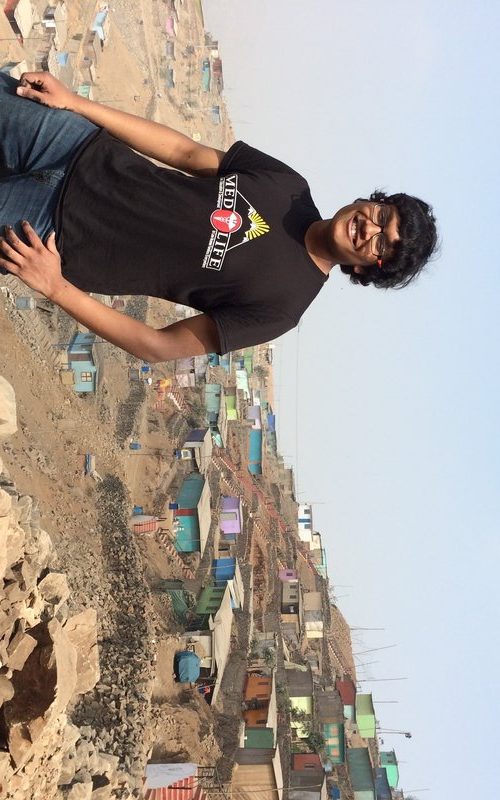
Scholar-Elect Vaithish Velazhahan has been researching the mechanisms by which flavonoids protect human health.
We know that flavonoids are good against cancer and other illnesses, but we are not using all their beneficial properties because we do not understand the mechanisms by which they work at a molecular level. This can help us create new drugs which work more efficiently.
Vaithish Velazhahan
It has been established for some time that eating fruit and vegetables is good for your health and can protect people from a range of illnesses, including some forms of cancer.
However, the way they do this is little understood. Vaithish Velazhahan's research seeks to establish how flavonoids – a diverse group of phytonutrients (plant chemicals) found in almost all fruits and vegetables – protect human health. He says: "We know that flavonoids are good against cancer and other illnesses, but we are not using all their beneficial properties because we do not understand the mechanisms by which they work at a molecular level. This can help us create new drugs which work more efficiently."
Vaithish [2018] is currently completing two degrees – in medical biochemistry and microbiology – at Kansas State University before he starts his PhD at the University of Cambridge. While doing his undergraduate degrees, he is working at Kathrin Schrick's laboratory which focuses on understanding the molecular mechanisms that govern how plant cells differentiate.
His research is aided by two major scholarships – $15,000 from the National Science Foundation for research on ecological genomics and $7,000 from the National Institutes of Health Kansas IDeA Network of Biomedical Research Excellence Scholarship- both of which allowed him to pursue independent projects.
Vaithish initially focused on plant genetics and in particular on the transcription factors which turn genes off and on. However, his main interest was in applying plant research to humans so he looked around for a project which would combine plant biology and human health. That was the seed for his subsequent research on flavonoids. Many previous studies on flavonoids' protective role have focused on animal models. Vaithish's research investigates specifically the hypothesis that flavonoids might directly interact with heat shock transcription factors in humans.
To study the different chemistry of proteins, he had to teach himself a lot of techniques from structural biology and protein biochemistry. These techniques had not previously been used in his laboratory so he had to work with scientists from other laboratories who had access to cutting edge tools. This independence and dedication is paying off.
In his research to date Vaithish has uncovered two mechanisms through which flavonoids work. "It is very exciting work," he says.
A passion for global health
Vaithish was born in Kansas in the US, but when he was one his parents moved back to Tamil Nadu in India. His father, a plant pathologist, was a postdoctoral associate at Kansas State University. At school Vaithish was always interested in learning how things worked. Having witnessed every day the impact of patients not having access to medical treatment, he decided that he wanted to become a doctor so he could change things. He graduated from school as the top student in his year and in the top 1% in the state, but discovered that, having been born in the US, he could not go to medical school in India. “It was totally unexpected,” says Vaithish. He decided to move back to Kansas to attend Kansas State University.
In addition to his research, Vaithish has been involved in a lot of extra-curricular activities, including MEDLIFE [Medicine Education and Development for Low Income Families Everywhere]. He was Vice President of the Kansas State University chapter of MEDLIFE for a year and worked in Peru and Ecuador with the non-profit's founder on some of its programmes. He was motivated in large part by his experiences in India and his desire to make a difference. Working in Latin America spurred Vaithish to start up his own non-profit, WE SAVE, in August 2016. It works in India and its focus is on teaching school children about the importance of vaccination programmes and working in collaboration with medical doctors in India. The organisation is now working on creating a mobile app to connect doctors better with patients who need access to healthcare urgently. "The aim is to create a network of doctors who can share the burden of treating people," says Vaithish, The app is being trialled in a small town in Tamil Nadu. WE SAVE has five people working on the ground in India and the pilot aims to expand to other areas of India in the summer. Vaithish's ultimate goal, however, is more ambitious – he wants to improve access to medicine globally.
During his PhD in the MRC Laboratory of Molecular Biology (LMB), he will use electron cryo-microscopy to try to understand the structures of key membrane proteins called G protein-coupled receptors (GPCRs) that help cells communicate with an organism's environment. Vaithish says: "More than 40 percent of all commercially available drugs target these proteins, so it is very important to understand their structures to design new drugs to treat a variety of human diseases."
He was drawn to the University of Cambridge because of Dr Christopher Tate's cutting-edge work on GPCRs and the pioneering work on electron cryo-microscopy under Nobel Laureate Richard Henderson. Vaithish is the first Gates Cambridge Scholar from his university. He says the Scholarship matches his mindset, goals and his passion for global health.












